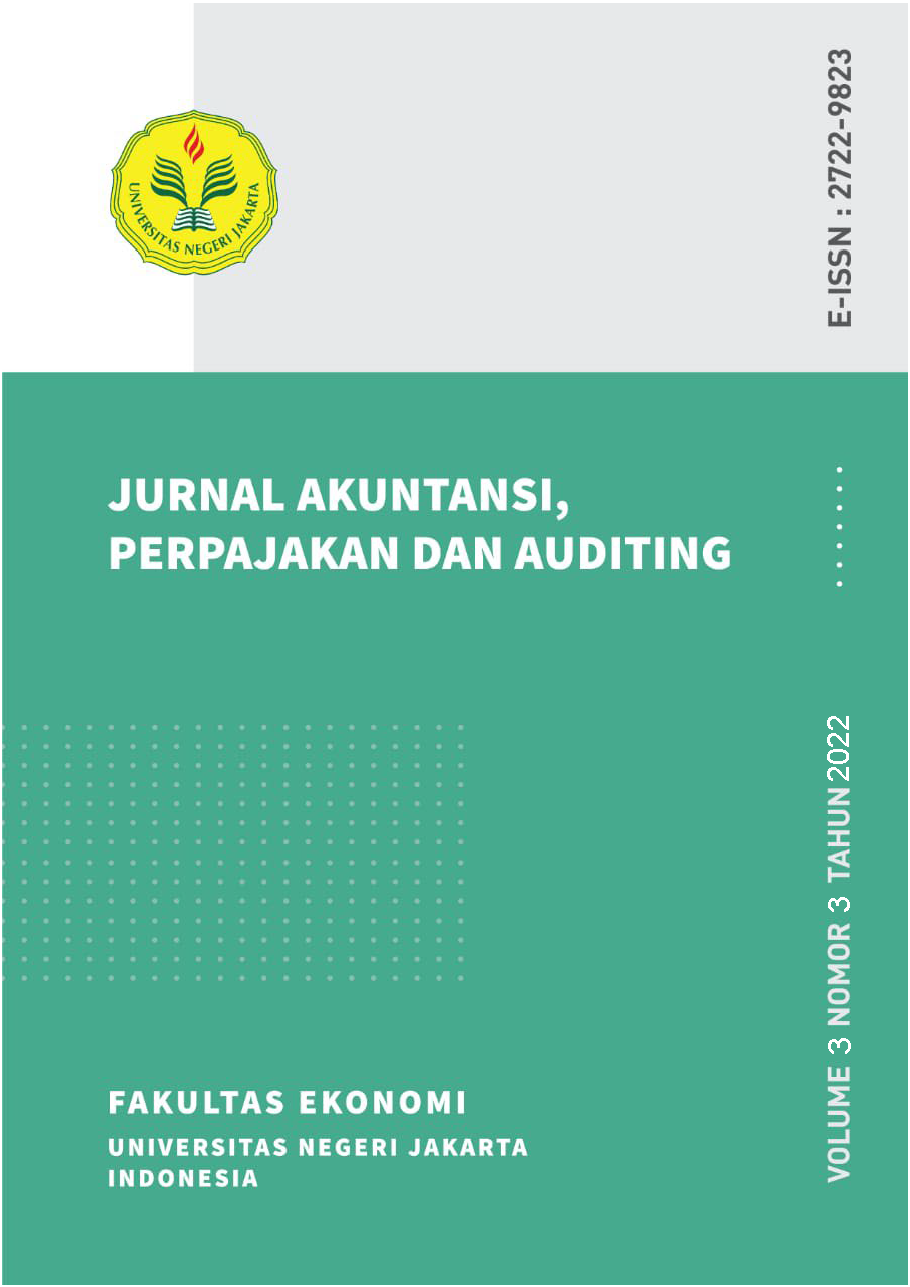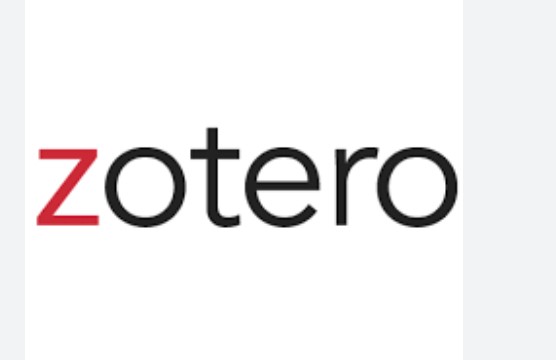The Effect of Financial Distress, Company Size, Earning Persistence, and Profitability on Accounting Conservatism
Abstract
This study aims to investigate the effect of financial distress, firm size, earning persistence, and profiability on accounting conservatism. This research is a quantitative research and uses secondary data which consists of financial reports. The dependent variable in this research is accounting conservatism. The independent variables in this research are financial distress, firm size, earning persistence, and profiability which measures by ROA. The unit of analysis and population which use in this research are companies which categorized in sector Consumer Non-Cyclical subsector beverages and processed food listed on Indonesia Stock Exchange for periods of 2017 – 2021. This research uses pusposive sampling method amounting 76 observation datas in type of unbalanced panel data.
The results in this research are financial distress and profitability partially have a negative effect on accounting conservatism. Whereas, firm size and earning persistence partially do not affect the accounting conservatism. Based on those results, a companies which have a high level of financial distress are tend to loosen their accounting conservatism because the high level of financial distress is a bad news for investors and creditors whilst managers will attend to cover up this issue by loosen the accounting conservatism. Companies which have a high level of profitability will tend to loosen the accounting conservatism to manage their existence on public. Companies which have a low level of profitability are tend to strengthen the accounting conservatism as the evaluation material of the issue on low level profitability. For investors and creditors, this research is expected to be a refference for business decision. For manager, this research is expected to be a refference on implementation of accounting conservatism policy.
References
Arista, M. A., & Kristanti, F. T. (2019). Pengaruh Leverage , Profitabilitas , Kepemilikan Manajerial , Konservatisme Akuntansi (Studi Empiris Pada Perusahaan Sub Sektor Food and Beverages yang Terdaftar di Bursa Efek Indonesia Periode 2014-2017). E-Proceeding of Management, 6, 3399.
Basu, S. (1997). The Conservatism Principle and The Asymmetric Timeliness of Earnings. Journal of Accounting and Economics, 24(1), 3–37.
Biduri, S., Wany, E., Suryani, A. I., & Afifah, S. N. (2019). Pengaruh Konflik Bondholders- Shareholders, Bonus Plan, dan Ukuran Perusahaan Terhadap Konservatisme Akuntansi (Studi Pada Perusahaan Manufaktur Sektor Industri Barang Konsumsi Terdaftar di Bei Periode 2013-2017). Seminar Nasional Cendekiawan, 1–8.
Fatma, N., & Hidayat, W. (2019). Earnings Persistence, Earnings Power, and Equity Valuation in Consumer Goods Firms. Asian Journal of Accounting Research, 5(1), 3–13. https://doi.org/10.1108/AJAR-05-2019-0041
Febriani, E., Maslichah, & Junaidi. (2020). Pengaruh Mekanisme Good Corporate Governance, Audit Brand Name dan Ukuran Perusahaan Terhadap Konservatisme Akuntansi Pada Perusahaan Manufaktur yang Terdaftar di Bursa Efek Indonesia Tahun 2016-2018. E-Jra, 9(12), 15–29.
Francis, J., LaFond, R., Olsson, P., & Schipper, K. (2004). The Market Pricing of Earnings Quality. Journal of Accounting and Economics. https://doi.org/10.2139/ssrn.414140
Givoly, D., & Hayn, C. (2000). The Changing Time-series Properties of Earnings, Cash Flows and Accruals: Has Financial Reporting Become More Conservative? Journal of Accounting and Economics, 287–320.
Haryadi, E., Sumiati, T., & Umdiana, N. (2020). Financial Distress, Leverage, Persistensi Laba dan Ukuran Perusahaan Terhadap Konservatisme Akuntansi. COMPETITIVE Jurnal Akuntansi Dan Keuangan, 4(2), 66. https://doi.org/10.31000/c.v4i2.2356
Junjunan, I., & Nawangsari, T. (2021). Pengolahan Data Statistik dengan Menggunakan EViews dalam Penelitian Bisnis.
Kristiantini, M. D., & Sujana, I. K. (2017). Pengaruh Opini Audit, Audit Tenure, Komisaris Independen, dan Kepemilikan Manajerial Pada Ketepatwaktuan Publikasi Laporan Keuangan. E-Jurnal Akuntansi, 2017(1), 729–757.
Kristina, D., & Yuniarta, G. A. (2021). Pengaruh Intensitas Modal, Financial Distress, Insentif Pajak dan Risiko Litigasi Terhadap Konservatisme Akuntansi Pada Perusahaan Manufaktur Sektor Industri Barang Konsumsi yang Terdaftar di Bursa Efek Indonesia Tahun 2016- 2020. Jurnal Akuntansi Profesi, 12(2), 460. https://doi.org/10.23887 jap.v12i2.36433
Levitt, A. (1998). The Numbers Game. New York: Presentation at the New York University Center for Law and Business.
Marzuki, M. ., & Wahab, E. . (2016). Earnings and Balance Sheet Conservatism in Malaysia: The Effect of Malaysia’s Convergence to International Financial Reporting Standards (IFRS). Asian Academy of Management Journal of Accounting and Finance, 12, 153–181.
Penman, S., & Zhang, X. (2002). Accounting Conservatism, The Quality of Warnings, and Stock Returns. The Accounting Review, 77(2), 237–264.
Putri, S. K., Lestari, W., & Hernando, R. (2021). Pengaruh Leverage, Growth Opportunity, Ukuran Perusahaan dan Intensitas Modal Terhadap Konservatisme Akuntansi. Wahana Riset Akuntansi, 9(1), 46. https://doi.org/10.24036/wra.v9i1.111948
Rivandi, M., & Ariska, S. (2019). Pengaruh Intensitas Modal, Dividend Payout Ratio dan Financial Distress Terhadap Konservatisme Akuntansi. Jurnal Benefita, 1(1), 104. https://doi.org/10.22216/jbe.v1i1.3850
Saptiani, A. D., & Fakhroni, Z. (2014). Pengaruh Volatilitas Penjualan , Volatilitas Arus Kas Operasi , dan Hutang Terhadap Persistensi Laba. Jurnal Akuntansi Riset, 12(1), 201–211.
Soekowati, I. E., Widiawati, H. S., & Winarko, S. P. (2021). Analisis Pengaruh Kesulitan Keuangan , Tingkat Hutang , dan Ukuran Perusahaan. Seminar Na, 730–736.
Sulastri, S., & Anna, Y. D. (2018). Pengaruh Financial Distress dan Leverage Terhadap Konservatisme Akuntansi. Akuisisi: Jurnal Akuntansi, 14(1), 59–69. https://doi.org/10.24127/akuisisi.v14i1.251
Suyono, N. A. (2021). Faktor Determinan Pemilihan Konservatisme Akuntansi. Journal of Economic, Management, Accounting and Technology, 4(1), 67–76. https://doi.org/10.32500/jematech.v4i1.1653
Syifa, H. M., Kristanti, F. T., & Dillak, V. J. (2017). Financial Distress, Kepemilikan Institusional, Profitabilitas Terhadap Konservatisme Akuntansi. Jurnal Riset Akuntansi Kontemporer, 9(1), 1–6.
Tista, K., & Suryanawa, I. (2017). Pengaruh Ukuran Perusahaan dan Potensi Kesulitan Keuangan Pada Konservatisme Akuntansi dengan Leverage Sebagai Pemoderasi. E- Jurnal Akuntansi, 18(3), 2477–2504.
Vichitsarawong, T., Eng, L., & Meek, G. (2010). The Impact of the Asian Financial Crisis on Conservatism and Timeliness of Earnings: Evidence from Hong Kong, Malaysia, Singapore, and Thailand. Journal of International Financial Management & Accounting, 21(1), 32–61.
Watts, R. L., & Zimmerman, J. L. (1986). Positive Accounting Theory. Prentice-Hall Inc.
Yuniarsih, N., & Permatasari, A. (2021). Pengaruh Kepemilikan Institusional, Kepemilikan Manajerial, Leverage Terhadap Konservatisme Akuntansi dengan Profitabilitas sebagai Variabel Moderasi. Jurnal Ekonomi Akuntansi, 6(April), 47–60.
Zakaria, A., & Adi, S. (2021). Pengaruh Ukuran Perusahaan, Intensitas Modal, Rasio Leverage, dan Kepemilikan Manajerial Terhadap Konservatisme Akuntansi. Prosiding Seminar Nasional & Call for Paper STIE AAS, September, 189–200.






